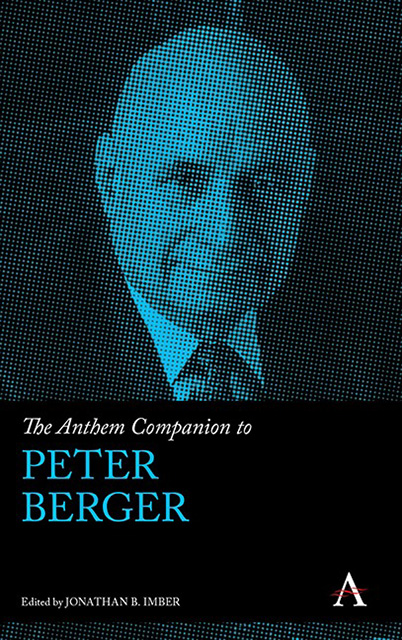Book contents
- Frontmatter
- Contents
- Introduction
- Chapter 1 Plurality, Choice, and The Dynamics of Doubt
- Chapter 2 Peter L. Berger and The Challenge of Modern Pluralism
- Chapter 3 Making Peace With Pluralism In America
- Chapter 4 Religion and Secularity in A Desecularizing Russia
- Chapter 5 The Moral Limits of Religious Pluralism
- Chapter 6 Peter L. Berger and Arnold Gehlen: Secularization, Institutions and Social Order
- Chapter 7 Peter L. Berger’s Three Religions
- Chapter 8 Objectivation: The Material Heritage of Peter L. Berger
- Chapter 9 Peter L. Berger’s The Social Construction of Reality
- Chapter 10 The Untaken Road to Phenomenological Sociology
- Chapter 11 Cheering for Capitalism
- Chapter 12 Peter L. Berger and Economic Sociology
- Chapter 13 Peter L. Berger Changed The Direction of My Work … and My Life
- Chapter 14 Peter L. Berger On Religion as Choice Rather Than Fate
- List of Contributors
- Index
Chapter 7 - Peter L. Berger’s Three Religions
Published online by Cambridge University Press: 17 October 2023
- Frontmatter
- Contents
- Introduction
- Chapter 1 Plurality, Choice, and The Dynamics of Doubt
- Chapter 2 Peter L. Berger and The Challenge of Modern Pluralism
- Chapter 3 Making Peace With Pluralism In America
- Chapter 4 Religion and Secularity in A Desecularizing Russia
- Chapter 5 The Moral Limits of Religious Pluralism
- Chapter 6 Peter L. Berger and Arnold Gehlen: Secularization, Institutions and Social Order
- Chapter 7 Peter L. Berger’s Three Religions
- Chapter 8 Objectivation: The Material Heritage of Peter L. Berger
- Chapter 9 Peter L. Berger’s The Social Construction of Reality
- Chapter 10 The Untaken Road to Phenomenological Sociology
- Chapter 11 Cheering for Capitalism
- Chapter 12 Peter L. Berger and Economic Sociology
- Chapter 13 Peter L. Berger Changed The Direction of My Work … and My Life
- Chapter 14 Peter L. Berger On Religion as Choice Rather Than Fate
- List of Contributors
- Index
Summary
Peter L. Berger needs few introductions. Although adopted by sociologists of religion as one of our own, Berger’s influence is much broader. As the chapters in this volume and a plethora of commentary attest, his name is often treated as synonymous with the emergence of “social construction” as a key term in the social sciences. Berger’s main work in the sociology of religion The Sacred Canopy is, in turn, in the author’s own words (1967, vi), “a direct application of the same theoretical perspective in the sociology of knowledge,” which he and Luckmann introduced in The Social Construction of Reality (Berger and Luckmann 1967), “to the phenomenon of religion.”
Yet, for all his constructionism, Berger’s sociology of religion is curiously disconnected from the broader framework introduced in The Social Construction of Reality. While the “systematic elements” in The Sacred Canopy (worldconstruction, theodicy, alienation) indeed follow the sociology of knowledge framework, they are much less evidently present in the “historical elements” (secularization, legitimation) of the book. Although Berger later said that “I found the sociology-of-knowledge framework of my early work very useful and have not been motivated to exchange it for another,” there is not a lot of evidence of it in his subsequent writings, even less so in the work inspired by him (Hjelm 2018).
I argue here that Berger’s writings on religion represent a missed opportunity for a genuinely constructionist approach. I use Berger’s definition of religion in The Sacred Canopy as a prism through which it becomes possible to understand the rather more traditional paths that Berger himself and sociology of religion inspired by his work has taken. “Three religions” is, then, not a reference to Berger’s biography—although that is also a story of religious switching (Berger 2008)—but rather to the substantive, functional, and constructionist approaches that the definition of religion in The Sacred Canopy enables. I discuss each approach and their role in the work of Berger and his followers in detail below.
A Reluctant Definition
In the preface to The Sacred Canopy, Berger emphasizes that “this book is not “a sociology of religion” ‘ (Berger 1967, vi). He is not interested in providing an overview of different sociological approaches to religion, including discussion of the different definitions of religion, which, Berger later wrote, he considered “sublimely uninteresting” (Berger 2014, 17)
- Type
- Chapter
- Information
- The Anthem Companion to Peter Berger , pp. 75 - 86Publisher: Anthem PressPrint publication year: 2023

